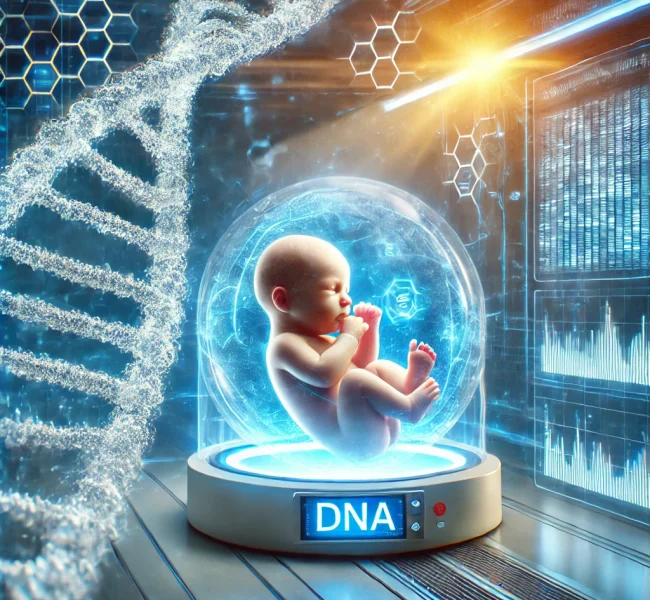In 2018, the scientific community was shaken by the shocking revelation that a Chinese scientist,He Jiankui, had successfully created the first gene-edited babies using CRISPR technology. This pioneering yet highly contentious experiment led to the birth of twin girls, Lulu and Nana, who were genetically altered to make them resistant to HIV. While some regarded this as a significant scientific achievement, others criticized it as an unethical advancement in human germline editing.
Who is He Jiankui?
He Jiankui was a researcher at the Southern University of Science and Technology located in Shenzhen, China. With a background in physics followed by training in biomedical research, he developed a keen interest in CRISPR-Cas9, a gene-editing technology that enables scientists to make accurate alterations to DNA. His main focus was on utilizing this tool to eradicate genetic disorders; however, he advanced his ambitions by attempting to alter human embryos.

The Experiment: Modifying the CCR5 Gene
He Jiankui’s research centered on the CCR5 gene, which is crucial for the HIV virus to penetrate human cells. His objective was to disable this gene to produce infants who would possess natural immunity to HIV, akin to a rare population with a naturally occurring mutation in the CCR5 gene.
The procedure included: 1. Employing in vitro fertilization (IVF) to generate embryos. 2. Utilizing CRISPR-Cas9 technology to edit the CCR5 gene. 3. Transferring the modified embryos into the mother’s uterus. 4. The delivery of twin daughters, Lulu and Nana, in late 2018. In November 2018, He Jiankui revealed his research via a YouTube video instead of a peer-reviewed publication, which astonished the scientific community. This approach was met with disapproval, as ethical standards typically advise against public announcements lacking thorough scientific validation. He further asserted that another pregnancy involving gene editing was in progress. During the Second International Summit on Human Genome Editing held in Hong Kong, He encountered rigorous scrutiny from scientists, ethicists, and journalists. Numerous attendees condemned his actions as irresponsible and lacking in transparency.
Ethical Issues
Informed consent is lacking: The parents may not have comprehended the full extent of the risks involved.
Germline editing has implications for future generations: Any genetic modifications will be inherited, potentially resulting in unforeseen effects on human evolution.
Breach of scientific standards: He Jiankui conducted his research clandestinely, circumventing established regulatory protocols.
Legal Consequences: In December 2019, He Jiankui received a three-year prison sentence for “illegal medical practices.” His research team was disbanded, and the Chinese government imposed stricter regulations on human gene editing.
The Ethical Debate: A Critical Examination Although He Jiankui’s research faced widespread criticism, it prompts significant ethical discussions regarding the future of gene editing
Was His Motivation Altruistic?
He asserted that his aim was to prevent disease rather than to create "designer babies." If gene editing can eradicate severe genetic conditions, should it be completely prohibited, or should it be subject to careful oversight?
Was His Motivation Altruistic?
He asserted that his aim was to prevent disease rather than to create “designer babies.” If gene editing can eradicate severe genetic conditions, should it be completely prohibited, or should it be subject to careful oversight?
Concluding Remarks: A Scientific Advancement or an Ethical Dilemma?
He Jiankui’s experiment has expanded the frontiers of science, yet it has also transgressed ethical boundaries. The potential of human gene editing is indeed exciting, but it necessitates careful consideration, transparency, and ethical governance. The experiences of Lulu and Nana highlight the critical need for science to remain aligned with moral principles. The global community now faces a pivotal question: How can we reconcile innovation with ethical standards in the realm of genetic engineering?
What happened to Lulu and Nana?
Currently, there is scant public information regarding the status of Lulu and Nana, the twin girls born in 2018 due to He Jiankui’s gene-editing initiative. The Chinese authorities have kept their identities private to ensure their protection. In 2022, a proposal was made by Chinese scientists to create a specialized healthcare facility aimed at monitoring and researching the health of Lulu, Nana, and another gene-edited child named Amy. This suggestion has sparked ethical debates concerning the potential infringement on the children’s privacy and the ramifications of ongoing medical scrutiny. Given the limited public information available, the health and welfare of Lulu and Nana remain largely uncertain. This situation highlights the ethical challenges associated with human gene-editing research and the obligations of the scientific community to protect the interests of those involved in such groundbreaking studies.
